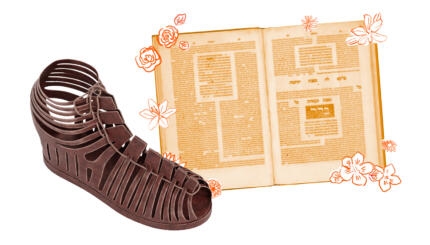One of the amazing things about Yevamot is the sheer number of situations we come across that seem so unlikely it’s hard to imagine how they’re even possible. Today’s daf brings us another one: a man who doesn’t know which of two sisters he is engaged to.
As context, let’s remember that betrothal in the Talmud is far more binding than it is in most contemporary contexts. Nowadays, if a couple wants to break an engagement, that’s largely between them. The partners are free to change their minds and go their separate ways. But in a traditional Jewish context, betrothal has a more binding quality to it, requiring a precise ritual to dissolve, akin to getting a divorce. The engaged couple can’t simply declare they no longer wish to marry and walk away.
That’s why the situation mentioned in a mishnah on today’s daf puts the man in a bit of a pickle. Marrying the sister of a woman he is engaged to is forbidden, so one of these women is off limits. But since he can’t be certain which one, the mishnah errs on the side of caution and treats them both as forbidden. The man is required to issue a bill of divorce to both of them lest they be permanently stuck in this untenable situation.
The Gemara picks it up from here:
With your help, My Jewish Learning can provide endless opportunities for learning, connection and discovery.
Learn from here in the mishnah that betrothals that cannot ultimately lead to consummation are nevertheless betrothals.
The Gemara draws a more general point from the mishnah: Even in complicated circumstances in which a marriage cannot be consummated, the original betrothals are still legitimate. As a result, it’s necessary for both women to be released from the betrothals so they can be eligible to marry others.
But we’re not quite done. The Talmud takes issue with the breadth of this general conclusion:
With what are we dealing here? A case when (at first both sisters) were recognized but later were mixed up. If so, there was not any flaw in the betrothal itself initially. The mishnah is also precise, as it teaches: And he does not know, but it does not teach: It is unknown.
The Gemara suggests that the mishnah is dealing with a case where the man knew at one point to whom he was engaged and became confused later. That’s why the mishnah says “he does not know” instead of “it is unknown,” implying that at one point it was known. In other words, the mishnah isn’t necessarily talking about all situations where we’re confused about which sister was party to the betrothal, but only to scenarios in which there was once clarity about who was to be the bride. Only in this situation is the original betrothal legitimate.
How is this even possible? The commentaries offer some suggestions, including post-betrothal chaos, an ambiguous proposal, or communication difficulties through an intermediary.
Regardless, the Gemara offers a solution to this problem that unbinds the two sisters and allows all involved to move on with their lives.
Read all of Yevamot 23 on Sefaria.
This piece originally appeared in a My Jewish Learning Daf Yomi email newsletter sent on March 30th, 2022. If you are interested in receiving the newsletter, sign up here.



